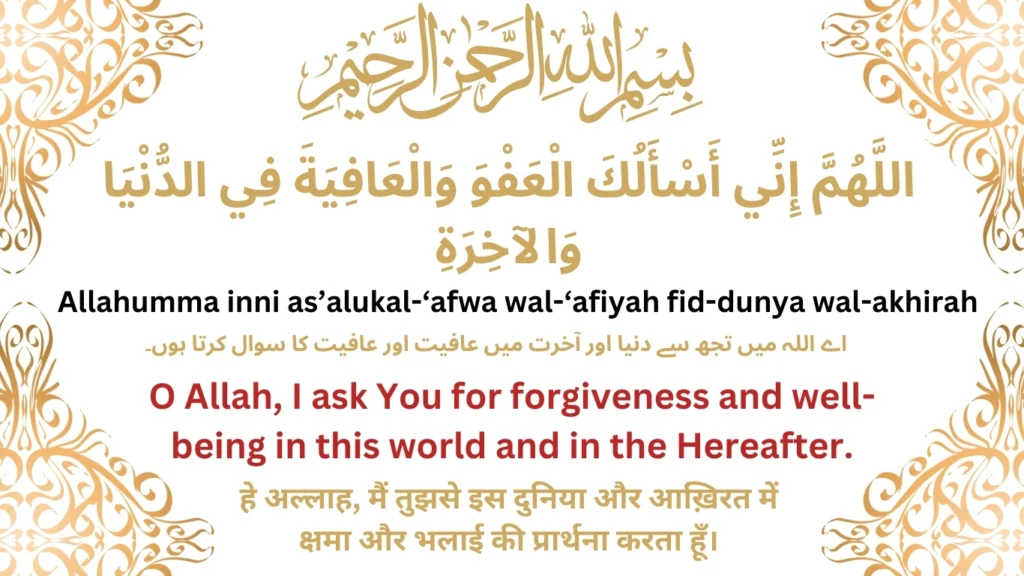In a world filled with challenges and uncertainties, many seek solace and guidance through prayer. One such powerful supplication, deeply embedded in Islamic tradition, is “Allahumma inni as’alukal-‘afwa wal-‘afiyah fid-dunya wal-akhirah.” This heartfelt invocation asks for forgiveness and well-being in both this world and the Hereafter. In this blog post, we will explore the profound meaning of this dua, its significance, and how it can impact the lives of those who recite it.
Allahumma inni as aluka dua

What is a Dua?
A dua is an Islamic prayer or supplication. It is a way for Muslims to communicate directly with Allah, seeking His mercy, guidance, and assistance. Unlike formal prayers (Salah), a dua can be made at any time, in any place, and in any language, making it a deeply personal and intimate act of worship.
The Importance of Dua in Islam
In Islam, dua is considered one of the most powerful tools a believer has. It is a testament to one’s faith and reliance on Allah. The Prophet Muhammad (peace be upon him) highlighted the profound power of dua, describing it as the very heart of worship.. Through dua, believers express their needs, hopes, and gratitude to their Creator.
The Role of Intentions in Dua
The sincerity of one’s intentions (niyyah) is crucial when making dua. It is not merely the words that matter, but the heartfelt plea and genuine desire for Allah’s help and mercy. A dua made with true sincerity can bring immense peace and contentment to the heart.
The Meaning Behind Allahumma Inni As Aluka Dua
The dua “Allahumma inni as’alukal-‘afwa wal-‘afiyah fid-dunya wal-akhirah” can be broken down into several parts, each carrying significant meaning:
- Allahumma – O Allah
- inni as’aluka – I ask You
- al-‘afwa – for forgiveness
- wal-‘afiyah – and well-being
- fid-dunya – in this world
- wal-akhirah – and in the Hereafter
English Translation and Interpretation
The English translation of this dua is “O Allah, I ask You for forgiveness and well-being in this world and in the Hereafter.” It is a comprehensive supplication that covers both spiritual and physical well-being, emphasizing the holistic nature of Islamic prayers.
The Spiritual Significance
This dua highlights the believer’s recognition of their dependence on Allah for both forgiveness and well-being. It reflects a balanced approach to life, acknowledging the importance of both worldly and spiritual success.
The Benefits of Reciting This Dua
Seeking Forgiveness
Forgiveness is a central theme in Islam. By asking for forgiveness, believers acknowledge their mistakes and shortcomings, seeking Allah’s mercy and pardon. This process of repentance purifies the soul and brings one closer to Allah.
Attaining Well-being
Well-being (al-‘afiyah) encompasses physical health, mental peace, and overall prosperity. By including well-being in this dua, believers ask for protection from harm, illnesses, and difficulties, seeking a life of ease and comfort.
Balancing Worldly and Spiritual Needs
This dua beautifully balances the need for worldly success and spiritual fulfillment. It reminds believers to strive for a meaningful and wholesome life, guided by faith and divine support.
How to Incorporate This Dua into Daily Life
Morning and Evening Remembrance
One of the best times to recite this dua is during the morning and evening remembrances (Adhkar). Starting and ending the day with this supplication sets a positive and hopeful tone, seeking Allah’s blessings throughout the day and night.
During Difficult Times
In moments of hardship and distress, turning to this dua can provide immense comfort and strength. It reassures believers that Allah’s mercy and support are always available, helping them navigate challenges with faith and resilience.
After Salah
Reciting this dua after the five daily prayers (Salah) is a wonderful way to conclude the worship. It extends the spiritual connection established during Salah, reinforcing one’s dependence on Allah for continuous guidance and support.
Stories and Examples from Islamic History
The Prophet Muhammad’s Use of Dua
The Prophet Muhammad (peace be upon him) frequently made dua, seeking Allah’s help and guidance in all matters. His life is filled with examples of how dua can transform situations and bring about positive outcomes.
Companions’ Trust in Dua
The companions of the Prophet Muhammad (peace be upon him) also placed great trust in dua. Stories of their lives illustrate the power of sincere supplication and the miracles that can unfold from it.
Modern-Day Examples
Even in contemporary times, believers continue to experience the profound impact of dua in their lives. Personal testimonies and stories of faith highlight the enduring relevance and power of this practice.
Practical Tips for Making Effective Dua
Sincerity and Focus
Approach dua with sincerity and focus. Clear your mind of distractions and concentrate on the words and their meanings. This enhances the spiritual connection and the effectiveness of the supplication.
Consistency
Be consistent in making dua. Regularly turning to Allah in both good times and bad strengthens one’s faith and reliance on Him. Make it a daily habit to seek His guidance and support.
Gratitude and Praise
Begin and end your dua with expressions of gratitude and praise for Allah. Acknowledge His blessings and mercy, and express your trust in His wisdom and plan.
Common Misconceptions About Dua
Misunderstanding the Purpose of Dua
Some may view dua as a means to get what they want instantly. However, the true purpose of dua is to foster a deeper relationship with Allah and to seek His guidance and mercy, regardless of immediate outcomes.
The Role of Effort
While dua is powerful, it should be accompanied by sincere effort and action. Believers are encouraged to work towards their goals, using dua as a source of spiritual strength and support.
Timing and Acceptance
The acceptance of dua is ultimately in Allah’s hands. Believers should trust in His timing and wisdom, understanding that unanswered prayers may carry hidden blessings or lessons.
Conclusion and Final Thoughts
The “Allahumma inni as’alukal-‘afwa wal-‘afiyah fid-dunya wal-akhirah” dua is a powerful and comprehensive supplication that seeks both forgiveness and well-being. By incorporating this dua into daily life, believers can strengthen their faith, find comfort in difficult times, and achieve a balanced approach to their worldly and spiritual needs.

